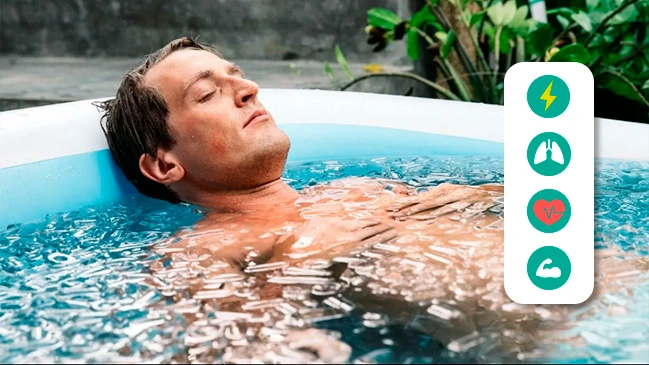Immersing oneself in cold water is an activity that often elicits mixed opinions among people: while some adore it and find in it a source of renewal and vigor, others detest it and prefer to avoid it at all costs. Nevertheless, many practice it regularly, even daily, convinced that it brings numerous benefits to their mental and physical health. (1)
For a long time, athletes have relied on ice baths to speed up their recovery process after intense exercise sessions and maximize their athletic performance. Although its origins date back to ancient Greece, where Olympic athletes submerged their bodies in icy water to alleviate pain and inflammation, nowadays this method has become more popular and accessible than ever.
Also known as cryotherapy, cold water immersion can take various forms, from swimming in natural environments like lakes, rivers, or oceans, to taking cold showers or submerging in ice baths. Regardless of the chosen modality, those who practice it seek to experience the stimulating and revitalizing effects offered by this unique experience.
Potential benefits (2)
Numerous studies suggest that immersing in icy water may have several benefits for muscle recovery. Exposure to extreme cold can help reduce inflammation by decreasing blood flow to the muscle tissues, which in turn may alleviate pain and fatigue. Additionally, it is believed that cold-induced vasoconstriction can help eliminate metabolic waste products accumulated during exercise, thus facilitating the recovery process.
Risks and limitations
Despite the potential benefits, immersing in icy water also entails certain significant risks and limitations. Some studies suggest that extreme cold may interfere with training adaptation by reducing muscle protein synthesis and decreasing the expression of genes related to muscle growth. Furthermore, cold-induced vasoconstriction can limit blood flow and muscle oxygenation, potentially negatively impacting long-term athletic performance.

Scientific research
Scientific evidence regarding the effects of icy water immersion on muscle recovery is mixed and often contradictory. While some studies have found significant benefits in terms of pain and inflammation reduction, others have questioned the effectiveness of this practice and suggested that it might be more effective as a placebo than as actual treatment. The quality and consistency of research vary considerably, making it difficult to draw definitive conclusions about the efficacy of cryotherapy.
Experiences and testimonials
The opinion of athletes and coaches regarding icy water immersion is diverse and often personal. While some attest to its benefits and regularly incorporate it into their recovery routines, others find it uncomfortable or even detrimental to their performance. Individual experiences may be influenced by a variety of factors, such as the type of exercise performed, the intensity and duration of training, and personal cold tolerance.
Recommendations
Given the controversy and lack of consensus in scientific literature, it is important to approach icy water immersion with caution and consider it as one tool among many in muscle recovery options, rather than a singular and universally effective approach. Those choosing to try this practice should do so in an informed and mindful manner, considering their own needs, goals, and personal cold tolerance. Furthermore, it is crucial to continue researching to better understand the underlying mechanisms and long-term effects of cryotherapy on athletic performance and muscle health.

Icy water immersion remains a topic of debate among athletes, coaches, and health professionals. While some find benefits in this practice for muscle recovery, others question its effectiveness and warn of potential risks. Ultimately, the decision to immerse oneself in icy water as part of a muscle recovery regimen should be based on careful evaluation of available evidence, as well as personal experience and individual preferences.
Sources:
(1) https://www.ondacero.es/noticias/sociedad/son-buenos-banos-helados-inmersion
(2) https://www.forbes.com/health/wellness/cold-water-therapy/


Your point of view caught my eye and was very interesting. Thanks. I have a question for you.
Thank you for your sharing. I am worried that I lack creative ideas. It is your article that makes me full of hope. Thank you. But, I have a question, can you help me?
Simplesmente desejo dizer que seu artigo é tão surpreendente A clareza em sua postagem é simplesmente excelente e posso presumir que você é um especialista neste assunto. Com sua permissão, deixe-me pegar seu feed para me manter atualizado com as próximas postagens. Um milhão de agradecimentos e por favor continue o trabalho gratificante
Hi Neat post Theres an issue together with your web site in internet explorer may test this IE still is the marketplace chief and a good component of people will pass over your fantastic writing due to this problem
Hi Neat post There is a problem along with your website in internet explorer would test this IE still is the market chief and a good section of other folks will pass over your magnificent writing due to this problem
Somebody essentially lend a hand to make significantly articles Id state That is the very first time I frequented your website page and up to now I surprised with the research you made to make this actual submit amazing Wonderful task
Thank you for the auspicious writeup It in fact was a amusement account it Look advanced to more added agreeable from you By the way how could we communicate
Thanks for sharing. I read many of your blog posts, cool, your blog is very good.
Your article helped me a lot, is there any more related content? Thanks!
Your article helped me a lot, is there any more related content? Thanks!
I don’t think the title of your article matches the content lol. Just kidding, mainly because I had some doubts after reading the article.
Thanks for sharing. I read many of your blog posts, cool, your blog is very good.
Can you be more specific about the content of your article? After reading it, I still have some doubts. Hope you can help me.
Your article helped me a lot, is there any more related content? Thanks!
Thanks for sharing. I read many of your blog posts, cool, your blog is very good.
Your point of view caught my eye and was very interesting. Thanks. I have a question for you.
Your point of view caught my eye and was very interesting. Thanks. I have a question for you.